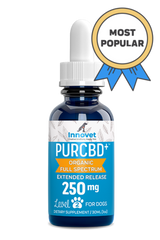- What is Deramaxx?
- What are the Recommended Dosages of Deramaxx?
- Precautions of Deramaxx
- What Are The Adverse Reactions of Deramaxx?
- Possible Adverse Effects of Deramaxx
- Gastrointestinal Adverse Reactions Of Deramaxx
- Possible Hematologic Adverse Reactions of Deramaxx
- Liver Effects of Deramaxx
- Neurological Side Effects of Deramaxx
- Other Adverse Effects of Deramaxx
- Alternatives to Deramaxx
- Why Do We Recommend CBD Oil for Dogs?
- Which Natural Ingredients Can Help My Pet?
- Is Deramaxx Or Natural Alternatives Best For My Dog?
- Deramaxx Tablets: Final Thoughts
A helpless feeling is knowing that your dog's pain or discomfort is hindering its life.
Sometimes you need to contact your veterinarian for some answers, and it ends with a prescription for a drug that you don't know anything about.
Trusting the advice of a veterinarian is common among dog owners - we have confidence in their knowledge of animals. As dog owners, we are also desperate to do whatever we can to alleviate our pet's sickness.
However, having knowledge about the medications that our dogs are being prescribed is vital as most have some adverse effects that can be, at the very least, unpleasant.
For this reason, we decided to write a review explaining the drug Deramaxx (deracoxib), so you can feel informed before giving it to your pet.
What is Deramaxx?
Deramaxx (common drug name deracoxib) is a prescription tablet that is made for use in dogs and other animals and not for use in humans.
It is a non-narcotic, non-steroidal anti-inflammatory drug (NSAID). A non-steroidal anti-inflammatory drug (NSAIDs) or corticosteroids are often indicated for the control of pain and symptoms like aches, fever, muscle pain, and inflammation.
Most people have heard of Ibuprofen as it is one of the most popular NSAIDs or corticosteroids found in most grocery stores and drug stores. Other drugs in this class are etodolac, etogesic, firocoxib (Previcox), and meloxicam.
Many people have used it as a convenient over-the-counter medication. Deramaxx deracoxib is the dog equivalent to Ibuprofen, a common medication for use in humans. Unfortunately, dogs experience much more potential for negative reactions from taking a non-steroidal anti-inflammatory drug (NSAID) or other drugs in this class. This is something that we will go over in detail later in this article. As a result, the use of NSAIDs and other corticosteroids should be avoided unless recommended by a vet.
You may be wondering "what results can I expect from giving my dog Deramaxx?" The prescription drug Deramaxx is often given to alleviate symptoms of postoperative pain and inflammation caused after dental surgery in dogs, orthopedic procedures, or dogs that suffer from arthritis.
There may be other occasions when a veterinarian feels that it would be beneficial for your dog. Deramaxx deracoxib chewable tablets are indicated for the control of pain and inflammation associated with osteoarthritis in dogs. They can provide your pooch with enough comfort to deal with the symptoms.
How Deramaxx Helps If Your Dog Undergoes Surgery
Deramaxx is a prescription medication used to relieve postoperative pain and inflammation in dogs. Deramaxx is typically given to dogs before they undergo surgery such as orthopedic or dental surgery and the postoperative orthopedic pain dose is determined by the veterinarian based on the dog's weight.
In most cases, Deramaxx is given once daily for pain relief. However, some dogs may require more frequent dosing in order to maintain an adequate level of pain control.
Deramaxx is generally well-tolerated by most dogs, but some may experience side effects such as gastrointestinal upset or increased thirst/urination. Overall, Deramaxx is an effective option for postoperative pain relief in dogs.
What are the Recommended Dosages of Deramaxx?
Deracoxib should only be prescribed by a veterinarian, and dogs should undergo a thorough history and physical examination. Be sure to contact your veterinarian immediately if side effects start to show. Note also that Deracoxib should be stored at room temperature between 59-86 degrees F.
The daily dose recommendation for dogs is 0.45mg/lb - 0.91mg/lb. given by mouth. It is important to follow those guidelines and the recommendations of the vet. Experts recommend using the lowest effective dose whenever possible.
Deracoxib is prescribed in 12 mg, 25 mg, 75 mg, and 100 mg tablets for particular dosing needs. The 25 mg tablets tend to be the most popular since 25 mg is the average daily dose for mid-sized dogs. However, to actually dose smaller dogs can be challenging, as they require a smaller amount of the drug per pound of body weight.
Elanco Animal Health, the makers of Deramaxx chewable tablets have made beef-flavored tablets to make it much easier to feed to dogs and increase the chances they will take the chewable tablet without a problem. They do recommend giving Deramaxx chewable tablets with other food to make it better for ingestion. Make sure to use the lowest dose at the beginning and tell your veterinarian if your dog experiences anything abnormal.
Elanco Animal Health's Deramaxx chewable tablets are easy to administer and have been formulated to provide long-lasting relief from pain and inflammation associated with canine osteoarthritis.
Precautions of Deramaxx
When it comes to giving your dog Deramaxx chewable tablets, there are a few things you need to keep in mind. First of all, adverse drug events can occur in some dogs, so it's important to be aware of the potential risks. Additionally, if your dog takes Deramaxx tablets on an empty stomach, they may experience adverse effects on their digestive system.
Finally, Deramaxx tablets can potentially cause adverse reactions and cause liver and kidney problems so it's important to talk to your veterinarian about whether or not this medication is right for your pet. By taking these precautions, you can help ensure that your dog stays safe and healthy while taking Deramaxx chewable tablets.
Checking for any pre-existing conditions in the digestive system, kidneys or liver may protect your dog from any complications. Kidney or liver issues can be made worse if a dog is given drugs in this class. Any dogs that are already taking something with Ibuprofen should not take Deramaxx chewable tablets. Additionally, dogs under four pounds in weight or under sixteen weeks old should not be given Deramaxx.
When your dog is taking Deramaxx, it is crucial that it is monitored closely by the veterinarian. The vet will know which tests to give and may ask you to look out for any signs that are concerning as well. This is to protect them and their long-term animal health while they are taking the chewable tablet.
Use with other NSAIDs or corticosteroids should be avoided if possible to eliminate the risk of negative drug interactions. Be sure to keep the tablets out of reach to avoid accidental ingestion.
Furthermore, dogs with the following conditions should not be administered Deramaxx:
- Dehydration
- Cardiovascular disease
- Gastric ulcers
- Hyperproteinemia
- Hepatic diseases or disorders
- Nursing or pregnant dogs
- Renal or kidney diseases
What Are The Adverse Reactions of Deramaxx?
At Innovet Pet, we understand that pet owners want to know all of the pros and cons of giving their dog Deramaxx or any medications that they are prescribed before giving it to them.
Our furry friends are a part of the family and Innovet Pet encourages researching everything so that they are as healthy and happy as can be. Below, we will go over the possible negative reactions to Deramaxx.
While it can be effective at relieving pain, there are potential side effects that owners should be aware of. Possible class side effects involving the digestive system, kidneys, or liver may occur.
Additionally, facial swelling, red or itchy skin, and an allergic reaction may also be experienced. If any of these effects occur, owners should contact their veterinarian immediately. With any medication, it is important to weigh the risks and benefits before starting treatment.
These effects are normally mild but may be serious. Pet owners should discontinue therapy and contact their veterinarian if they notice any adverse reactions from Deramaxx. The severity of the effects may vary between dogs. Although negative reactions do occur, these are normally non-fatal issues.
Like any drug, be sure to keep it out of reach of children, as the tablet medication is only for use in dogs. If accidental ingestion by a human occurs, seek medical advice straight away.
Possible Adverse Effects of Deramaxx
This list includes possible negative reactions of Deramaxx include:
- Lethargy
- Loss of appetite or lesser desire to eat
- Depression
- Loss of body weight
- Fever
- Dehydration
- General low energy
- Loss of interest in things enjoyed
- Weakness
Gastrointestinal Adverse Reactions Of Deramaxx
There are some possible gastrointestinal negative reactions that could affect your furry pal that we will discuss below. The gastrointestinal distress and class side effects involving the digestive system can come from the tablet affecting the stomach lining.
Although the Deramaxx chewable tablets are indicated for the control of pain and inflammation associated with osteoarthritis in dogs, you should look out for the following class side effects involving the digestive system.
Some effects may be serious, pet owners should discontinue therapy and contact their vet immediately.
Gastrointestinal negative effects are:
- Abdominal pain and inflammation
- Gastrointestinal perforation
- Vomiting/Diarrhea
- Vomit containing blood
- Gastrointestinal ulceration
- Black and tar-like stools
- Hematochezia (blood in stool)
- Elevated amylase and lipase in the blood (usually signs of pancreatitis)
- Overactive salivation
Gastrointestinal problems involving the digestive system are not the end of possible issues with Deramaxx tablets, unfortunately. There are also hematologic adverse effects (affecting your dog's blood) that could be a concern in your pet.
Possible Hematologic Adverse Reactions of Deramaxx
Hematologic negative reactions refer to the possibility of Deramaxx tablets affecting the blood in dogs. Most have likely heard of hematology in reference to iron or blood platelets. However, hematologic effects are rare and normally mild but may occur and be life-threatening if not treated.
This is why it is so important to ensure that your dog is under a veterinarian's supervision if they are administered Deramaxx. If pet owners notice any hematologic complications after taking Deramaxx tablets, they should contact their veterinarian immediately.
After taking Deracoxib, dogs should undergo a thorough history and physical examination which includes checking your pet's blood levels to see if there are any problems with Deramaxx affecting their blood levels.
Speak to a vet if you think your dog has any pre-existing blood issues.
The hematologic adverse effects of Deramaxx are:
- Anemia (low iron levels in the blood)
- Leukocytopenia (low levels of white blood cells)
- Leukocytosis (high levels of white blood cells)
- Thrombocytopenia (decreased levels of blood platelets)
Liver Effects of Deramaxx
There are also potential hepatic (liver) side effects from administering Deramaxx tablets.
- Elevated liver enzymes
- Jaundice
- Ascites
- Low Blood Urea Nitrogen
Neurological Side Effects of Deramaxx
Neurological side effects of Deramaxx tablets are concerning and should be watched out for with vigilance and immediate veterinary care:
- Seizures
- Improper balance and coordination
- Learning for support of body movement
- Falling or collapsing
- Shivering
- Eye movements that are involuntary
- Paresis of hindlimbs
- Tilting of the head
- Paw inaccuracy
Also, just a general change in balance or coordination may occur but isn't common. A difference in their ability to get around or do what they usually do should be reported to the veterinarian immediately for evaluation.
Neurological effects may vary between breeds. While they may occur, these are normally extremely rare.
Other Adverse Effects of Deramaxx
There are also other possible adverse reactions to Deramaxx chewable tablets. Innovet Pet is leaving no stone unturned when it comes to animal health.
Other problems to look out for when giving your dog Deracoxib are changes in behavior that are not their norm. If they are acting differently, then take note of it and keep monitoring their health along with their vet.
Respiratory changes should also be monitored. For example, excessive panting or breathing heavily is a possible respiratory issue with Deramaxx tablets. Also, bleeding from the nose or coughing can also be signs that your pet is having respiratory distress.
Cardiovascular complications are a possibility after administering Deramaxx tablets to your dog, and some things to look out for are a rapid or slow heartbeat, irregular heartbeat, and more.
Eye or skin damage or changes can occur, as well as an overdose is a possibility. This is why it is so important to only give your dog Deramaxx chewable tablets under the supervision of a veterinarian.
The prescription tablet dose and the instructions provided by the veterinarian are to be followed precisely. If there are any changes in the health of your pet, they will be well informed on how to care for your dog correctly if there is a problem that arises.
If a pet owner suspects their dog has taken too much, they should contact their veterinarian immediately if side effects are apparent.
Alternatives to Deramaxx
It is understandable that a pet parent would consider not giving their pet something that has such a long list of potential adverse effects that could make a pet more miserable than ever. The good news is that there are some wonderful alternatives to Deramaxx tablets that can help your dog take control of pain and inflammation associated with osteoarthritis in dogs or orthopedic surgery.
Here at Innovet Pet, we offer natural alternatives to Deramaxx tablets that can genuinely help your dog without the long list of worrisome negative reactions that medications have. One of our top recommendations for an all-natural alternative is CBD Oil For Dogs
Why Do We Recommend CBD Oil for Dogs?

One of the most popular natural options for humans is CBD oil. The best news for pet owners is that this all-natural alternative is also great for dogs. CBD is from the cannabis plant and offers many benefits without the adverse reactions that other things have. For example, it is a natural plant found occurring in nature.
CBD itself is derived from the cannabis plant and is also known as marijuana or hemp. The CBD oil for dogs is derived from hemp and means that it contains less than .3% of THC. That means that your furry friend won't be high. It will merely give health benefits that can improve the health and well-being of your dog without the risks that a prescription tablet comes with.
Amazingly, CBD oil for dogs works as well as it does for humans. People use it for anxiety, reduction of seizures, elimination or reduction of pain and inflammation, etc. Dogs are able to enjoy the same benefits that we people do.
It is a true anti-inflammatory natural oil that has all of the benefits without all of the risks. Having a natural and non-toxic product that we can give our dogs is a blessing and one that many pet parents will be able to enjoy.
CBD oil for dogs can be used in a wide variety of ways. After surgery, helping with anxiety, alleviating pain and inflammation, and much more. Giving your dog something that is all-natural can also ease the concerns that they will have to deal with horrible negative implications. Those are not an issue when it comes to CBD and its natural anti-inflammatory benefits.
Which Natural Ingredients Can Help My Pet?
There is a reason that the all-natural and organic movement has surged in popularity in recent years. That reason is that people and animals can enjoy health benefits without ingesting unnatural chemicals. It's all the reward and none of the risk.
See some of our favorite Hemp Pet Products and decide for yourself which ones you think would benefit your dog the most. We have hemp dog treats and chews, CBD Oil, and more that you can give your pet for relief from the ails and woes that they may be going through. Imagine seeing your furry friend feel a lot better after giving them a delicious hemp treat that they chew up and devour! They get to enjoy animal health benefits while also having a tasty treat. That is definitely a win-win in our book. Who doesn't love to see their pet happy and satisfied?
There are also some herbs and spices that you can offer your pet for natural healing and benefits. Humans have been using spices as treatments for pain and inflammation for centuries. Turmeric, liquorice, and comfrey are all-natural herbs that are found occurring in nature that you can give your pet some extra relief that has relatively zero adverse effects.
They each offer anti-inflammatory and pain relief properties that seem to work very well for humans and dogs. Humans have taken these natural herbs for centuries and enjoyed the benefits for just as long. Dogs can enjoy those same benefits. It would be a great addition to their diets that you could just add to their food or give them in another recommended way.
We do encourage you to visit a holistic veterinarian if you want to ensure that your dog is healthy or if you have any particular questions about holistic and all-natural remedies.
Is Deramaxx Or Natural Alternatives Best For My Dog?
This is something that pet owners will have to decide for themselves and research thoroughly. It is a personal decision and why Innovet Pet believes in giving out as much information as possible, as we want pet parents to be able to make the best decision they can. It will indeed be up to you to decide what you feel is best for your furry friend. Also, having the guidance and advice of a trusted veterinarian is invaluable and highly encouraged.
While it's vital to help your furry friend battle the symptoms of aging, such as aches, pain, and inflammation, the last thing you want is to watch them struggle with drug-related negative reactions.
It is undoubtedly vital to talk to your veterinarian and have them monitor your pet if you do decide to administer Deramaxx tablets as there is undoubtedly a long list of possible adverse reactions that can be scary to deal with. Having your trusted veterinarian there can make all of the difference to your dog's health and whether they recover well.
What is right for one dog is not necessarily right for other dogs. All that a pet parent can do is make the best decision that they can at the time - and we hope this article helps you to decide whether or not Deramaxx tablets are right for your pet, or if a natural alternative is the better course.
Deramaxx Tablets: Final Thoughts
At Innovet Pet, we are pet owners as well, and understand how hard it can be to decide what to give our dogs when they are suffering.
The desperation and heartache at seeing our dogs struggling with pain and inflammation and not knowing what to do are devastating and something that many pet owners have gone through themselves at one point or another.
Deramaxx is an option that some pet owners are given by veterinarians when the vet feels that it would benefit them at that moment.
There is a chance it could work very well for your dog. However, the drawback of adverse reactions is quite concerning and why many pet owners give pause. When the potential for negative effects outweighs the potential benefits, being concerned is warranted. Remember, Deramaxx is for dogs only and keeps it out of reach of children.
We do encourage pet parents to find a natural alternative to drugs for their pets due to the potential adverse effects and significant health problems that they could cause. A non-narcotic non-steroidal anti-inflammatory drug may not be the ideal choice for your pet to help with pain and inflammation.
Thankfully, we have all-natural products right here at Innovet Pet that can make a big difference to your dog's quality of life and give them a natural, non-toxic option that has all the benefits and no drawbacks.
















